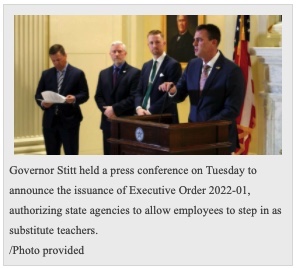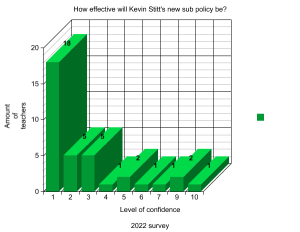Governor Stitt’s New Substitute Teacher Policy

| provided
Photo of Gov. Stitt. issuing the executive order.
Governor Kevin Stitt recently introduced a new policy allowing employees at state agencies to substitute teach, while retaining their current salary and benefits, in an attempt to help with the teacher shortage caused by a surge in COVID cases. The executive order will allow up to 32,000 state employees to sub in classrooms. The order comes as a growing number of school districts transition to distance learning after a landslide of staff absences.
Due to the immense critique under which this policy has been subjected, a survey was sent out to the teachers and staff of Norman North High School. Of the 36 responses, some were negative, while others were quite optimistic about the policy. The option for anonymity was extended to those who took the survey, in the hopes of ensuring that all surveyed could voice an opinion without fear of backlash.
One issue that was brought up throughout the responses was that state employees lack necessary training in order to be successful in the classroom. In particular, special-needs students require a specialized teacher to help them because of their disabilities.
“Caring for special education students with high needs requires a great deal of training and intuition that can not be provided by inexperienced and unqualified substitutes.” One teacher said. “Not only is this incredibly dangerous for the student and staff, but it does not uphold a student’s IEP (Individualized Education Plan) as having CPI (Crisis Prevention & Intervention) trained individuals working with them and becomes a larger issue.”
This insight shows one of the fears many teachers have. Theoretically, there could be a member of the Department of Transportation called in to substitute for AP Calculus. However, under this authorization, state employees will still need to pass a background check and complete any training required by the district in which they are volunteering.
There was the counterpoint proposed by another teacher, “I think it will be helpful.” They said. “It will help keep schools open. Students are not successful in distance/virtual learning which is evident from so many students being behind and retaking classes. Also, people need to understand, this is not to replace teachers, he [Stitt] never said they would be highly qualified teachers. He is sending help, not demeaning our profession.”
One noticeable trend in the data was a desire shared by many teachers, to remain anonymous. Whether it was out of fear of judgment from their colleagues or worry for their jobs. Whatever the cause is, should we be worried about the fear that teachers have when voicing their opinions on policies that directly affect them? A whopping 66 percent of teachers wished to remain anonymous.
Having students in school is a powerful argument, as school can be an escape from bad home lives, provide a warm meal for students that they might not get otherwise, and allow students to be social with one another, learning aside. Even before the executive order, educators understood the need for students to be in person.
“We all agree it is best for schools to be open, and I appreciate that the governor has finally recognized this crisis. But we need caring, equipped teachers in classrooms and for the focus to be on learning. This gesture is a cup of water on a raging fire,” Joy Hofmeister, State Superintendent said.

It was not just the teachers who have been affected by this policy as the office staff is also understaffed and overworked.
“With respect, there is staff other than teachers that are necessary to keep the school open and have it run effectively. We’ve had 3 secretaries out. There are no subs for secretaries. “Jenabec Higdon, office staff, said. “We’re lucky enough that our Guest-Teacher Secretary has remained healthy and at work, but even so could [we could] desperately use help in the wake of these mass absences; help that can’t be provided; all of this when your department already needs more help under regular circumstances. Can we talk about our poor nurse?!!! Stitt is not considering the enormous load left to the remaining on-site staff members, including teachers (because subs are needed and appreciated, but [they] require a lot of help that the teachers they’re subbing for don’t need) who must carry on the work and responsibilities that absolutely require more hands. The staff that is lucky enough to not get sick are required to fill in the holes. These holes can not be filled adequately. This leaves these staff members depleted, edgy, and (try as they may not to be) resentful. The students absolutely pick up on this. Just yesterday, a male student told me that being at school lately was ‘weird’ and ‘not fun anymore and that ‘everyone seems sad or mad.’ And, unfortunately, he is correct. And this result applies to all school employees including TAs, custodians, and those in the cafeteria. But from first-hand experience, when we secretaries, working short-staffed, can not keep up with the demands of the students and parents, we’re often met with anger, impatience, frustration, and verbal assault. While it’s obvious that many variables go into the decision to go remote, the impact of employee absence in all positions should be one of the variables considered.”
This has been an overlooked consequence of this pandemic and an ineffective fix to a complex problem.






